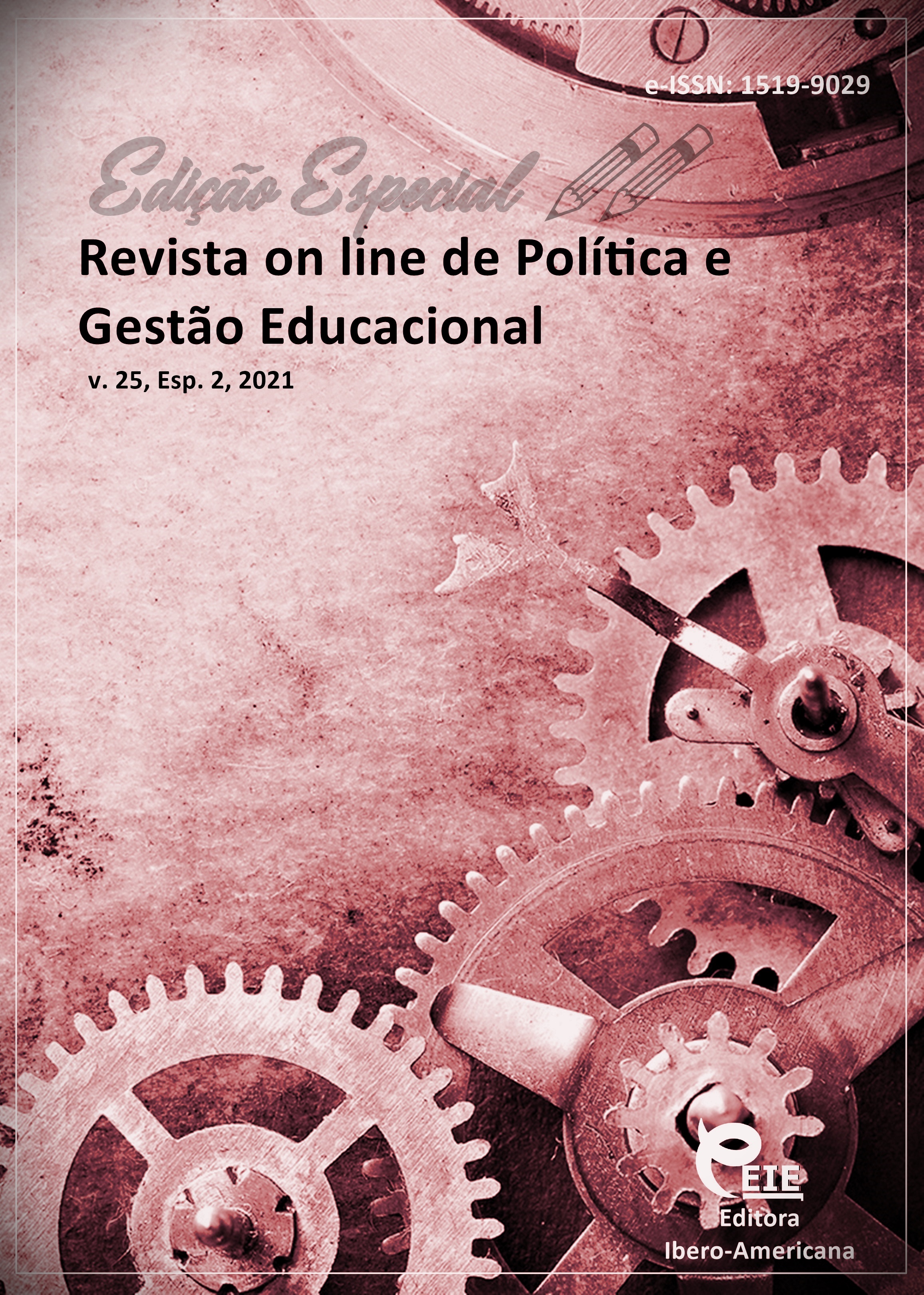Developing creative activity abilities of students in higher educational establishments
DOI:
https://doi.org/10.22633/rpge.v25iesp.2.15274Keywords:
Geometry, Task, Analogy, Generalization, Creative activityAbstract
The article discusses methods for solving geometric problems with the active use of methods such as analysis and synthesis, analogy and generalization, based on theoretical thinking on the principle of ascent from simple to complex in order to develop students' ability to creative activity. The authors have developed systems of problems, focused on the formation of their ability to "make" independent discoveries both in the process of solving a problem and at the stage of researching the result of the solution. The developed system of problems is aimed at finding a way to solve a more complex problem, after a similar method has been used in relation to another simpler or particular problem. The participants in the experiment are future masters of pedagogical education (profile "Mathematical Education") at Togliatti State University. The article shows that the most effective methods of preparing future masters of mathematics education for creative professional activity can be such methods of scientific knowledge as analogy and generalization. It was revealed that in the process of learning to solve geometric problems included in the developed system, students demonstrate higher indicators of the level of formation of creative activity, as a result of the development of the ability of the future master of pedagogical education (profile "Mathematical Education") to analogy and its application in specific situations, his ability to use the established properties, skills and abilities formed, techniques and methods of action in relation to another object in new conditions and for new purposes, the use of mathematical concepts and theorems in more and more diverse specific problems.
Downloads
References
ANDREEV, V. I. Dialectics of education and self-education of a creative personality: Fundamentals of creativity pedagogy. Kazan: Publishing house of Kazan University, 1988.
DAVYDOV, V. V. The concept of humanization of Russian primary education (the need and possibility of creating an integral system of developing primary education). Psychological Science and Education, v. 5, n. 2, 2000.
DOROFEEV, S. N. et al. Formation of research competencies of students in a modern mathematics lesson. Modern High Technologies, n. 10, p. 181-185, 2018.
DOROFEEV, S. N. Theory and practice of forming the creative activity of future teachers of mathematics in a pedagogical university. 2000. Dissertation (Doctorate) – Moscow Pedagogical State University, Moscow, 2000.
GLAZKOV, Y. A.; EGUPOVA, M. V. Geometry assignments for the formation of universal educational activities in basic school. Mathematics at school, n. 2, p. 24-31, 2017.
KALINKINA, T. M. Dynamic tasks as a means of improving the process of teaching geometry in high school. Saransk: Publishing house of the Mordovian State Pedagogical Institute. 1995.
KALMYKOVA, Z. I. Understanding of educational material by schoolchildren. Bulletin of Practical Psychology of Education, n. 1, p. 21-25, 2013.
LERNER, I. Features of teaching children with disabilities in mathematics lessons EU Lisitsa, Deputy Director for SD, MBOU "School number 66". BBK 74.262. 21 M34, 24. 2016.
LODATKO, E. A. Philosophy of teaching mathematics as a semantic component of the modern educational space. TSU Science Vector: Series: Pedagogy, Psychology, n. 1, p. 107-111, 2015.
MENCHINSKAYA, N. A. Problems of education, upbringing and mental development of the child. Moscow: Psychol.-social. IN-T, 2004.
MUDRIK, A. V. Human socialization. 2004.
PODLASY, I. P. Pedagogy: 100 questions-100 answers: textbook. Manual for stud. Higher. Study Institutions. Moscow: Vlados-Press Publishing House, 2001. 368 p.
ROZLUTSKA, G. M. et al. Educational traditions of healthy lifestyle of pupils of public schools of transcarpathia (1919–1939). Medical Education, n. 2, p. 127-132, 2020. DOI: 10.11603 / me.2414-5998.2020.2.11162
SAMYGIN, S. I.; STOLYARENKO, L. D. Psychology and pedagogy. 2012.
TEMERBEKOVA, A. A. et al. Theoretical foundations of personality development in the context of interactive learning technologies. 2013.
UTEEVA, R. A. Substantive and methodological features of training masters of mathematics education in Russia. Science and Education a New Dimension, t. 3, v. 45, n. 22, p. 14-17, 2015.
UTEEVA, R. A.; ORAZYMBETOVA, G. S. Actual problems of the implementation of the stochastic content line in the school mathematics course. Letters to the Issue. Offline: Electronic Scientific Journal, n. 11, p. 1908-1908, 2012.
VAGANOVA, O. I. et al. Personally-oriented professional education. Baltic Humanitarian Journal, v. 9, n. 2, p. 112-115, 2020.
VYGOTSKY, L. S. Pedagogical psychology. 2007.
WINTER, I. A. Education strategy: opportunities and reality. Knowledge. Understanding. Skill, n. 1, 2006.
Published
How to Cite
Issue
Section
License
Copyright (c) 2021 Revista on line de Política e Gestão Educacional

This work is licensed under a Creative Commons Attribution-NonCommercial-ShareAlike 4.0 International License.
Manuscritos aceitos e publicados são de propriedade da Revista on line de Política e Gestão Educacional. É vedada a submissão integral ou parcial do manuscrito a qualquer outro periódico. A responsabilidade do conteúdo dos artigos é exclusiva dos autores. É vedada a tradução para outro idioma sem a autorização escrita do Editor ouvida a Comissão Editorial Científica.











